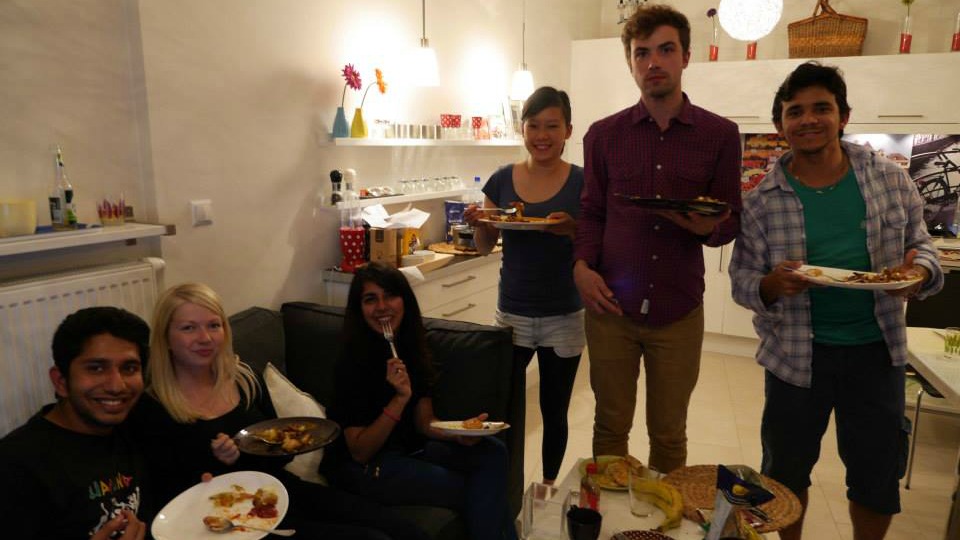Fruits of a Nation
Jay Turchansky
Friday, August 18, 2017

The staff of Salt + Light Media come from 14 different countries. This summer, for Canada's 150th anniversary, we are reflecting on what makes Canada so special to each of us. Here Jay Turchansky, Junior Editor, reflects on the relationship food has with national identity.In 2014, I went to Poland for a volunteer exchange along with seven other students from around the world. Hong Kong, Australia, Russia, Finland, India, Brazil, USA were represented and, of course, so was Canada. One night we decided to hold an “International Food Night” for us and our new Polish friends. For the most part, we could guess what each of us was going to bring. Australia - Vegemite. USA - Apple Pie. Canada - Poutine. This made me reflect on how closely food is tied to national identity: it often reflects our lifestyles or native species to the land. In Northern Canada, many people eat whale, seal, caribou, and other meats typically found on the arctic tundra or waters. While this does have elements of tradition, many times it comes as a result of not being able to afford items typically found in a Canadian diet. For example, a kilogram of tomatoes costs $6.99, compared to $3.75 in Toronto. This price difference often results from the cold temperature: produce cannot be grown on permafrost, the Arctic waters are only traversable when the ice melts in the spring/summer, and even when they are, the distance is quite large. These high prices combined with typically lower incomes creates tension within communities. Growing North, a student-run non-profit based out of Ryerson University in Toronto, saw this issue and decided to do something about it. They developed a type of greenhouse that could be used to grow produce in cold temperatures at a fraction of the cost of shipping. I had the opportunity to work with them as they hoped to win a grant from the Google Impact Challenge. We created two online videos to introduce the food scarcity issue and entice the viewers to vote for them:
Food is Love
Tomato - An Apple Parody
Unfortunately they did not win the grant, but they aren’t the only ones hoping to help their brothers and sisters up north. The Society of St. Vincent de Paul Canada launched a campaign called “North of 60” which aimed to help small communities in the north through local food donations. Councils would collect dried goods from individuals and corporate partners to be stuffed into shipping containers. Shipping companies partner with them to send the containers to remote communities to be distributed to those who are in need. I worked with the national council to edit a video to be shown at the United Nations and used for further promotion and education of the food issue and the program. The video was filmed by volunteers in the different communities, and reveals that food is just one issue that the northern communities face.North of 60
It’s great to see Catholic and secular organizations tackle these issues while not overlapping. Both the short and long-term are addressed with both groups working towards the common cause. I think that’s one of the most Canadian things one can do. We can pray that in the next 150 years our neighbours in the north will be as amazed by poutine as my international friends were.Related Articles:
Tag: European Union
Pope Francis’ Address to European Union Heads of State and Government
Friday, March 24, 2017
 Salt + Light Media
Salt + Light Media
This afternoon, Pope Francis received the 27 European Union heads of State and Government at a private audience in the Vatican’s Sala Regia. The encounter takes place on the eve of the 60th anniversary of the signing of the Treaties of Rome. The Treaties are considered to be the foundation acts of the European Community. […]
Behind Vatican Walls: I Have a Dream…
Friday, May 6, 2016
 Alicia Ambrosio
Alicia Ambrosio
The Charlemagne Prize was created in 1949 by Dr. Kurt Pfeiffer in Aachen, Germany as a reminder and a call for European unity. The 2016 prize was awarded to Pope Francis this week. In post-war Europe several new organizations and pacts were in development. These organizations and agreements would unify Europe economically and politically. However, […]
Vatican Connections: April 24, 2015
Friday, April 24, 2015
 Alicia Ambrosio
Alicia Ambrosio
Bigger than any financial scandal or bishops’ resignation was the story of hundreds of illegal migrants who drowned off the coast of Libya when their vessel capsized. Pope Francis used his Angelus address to draw attention to the tragedy and call on the international community to take “decisive and quick action” to prevent further tragedies. […]
Recap of Pope Francis’ Visit to European Parliament
Tuesday, November 25, 2014
 Salt + Light Media
Salt + Light Media
The man who designed the European Union flag, Arsène Heitz, was inspired by scripture and the image of Mary on the Miraculous Medal. While he never hid the fact that the flag he designed is “Our Lady’s flag”, the European Union itself has offered different explanations for the evocative design. The flag, and the EU […]
Pope Francis is Coming to the United States – Perspectives Daily
Monday, November 17, 2014
 Stefan Slovak
Stefan Slovak
Today on Perspectives, Pope Francis announces he is coming to the United States, tells a gathering that marriage and the family are in crisis, his weekly Angelus, condemns abortion and other medical procedures that violate human dignity and a look ahead to his trips to Strasbourg and Turkey.
SUPPORT LABEL
$50
$100
$150
$250
OTHER AMOUNT
DONATE













